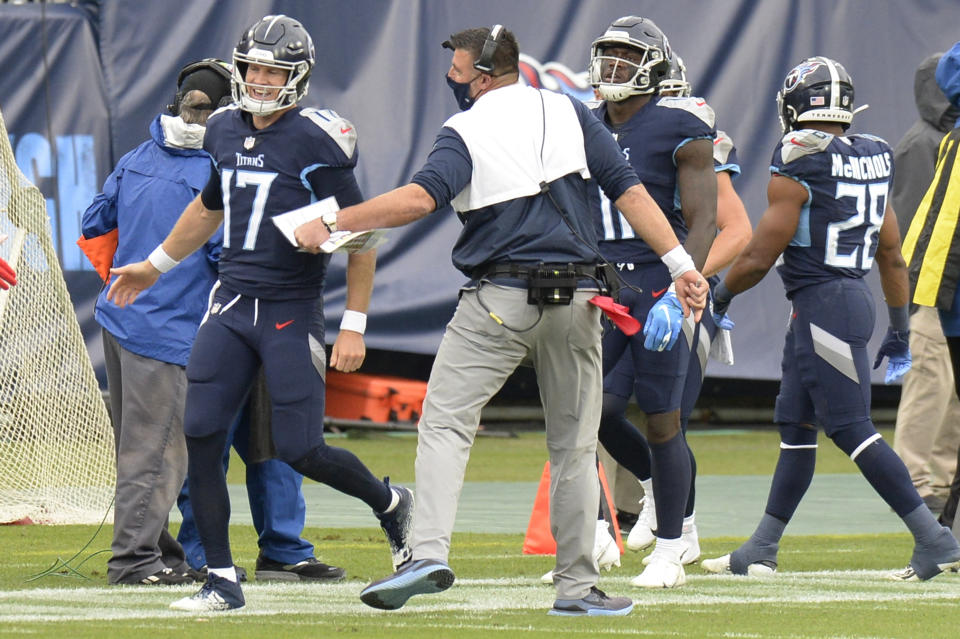Did a brilliant intentional penalty enable the Titans' comeback vs. Texans?
The Tennessee Titans are still undefeated, and their heroes on Sunday against the Houston Texans were the usual suspects. Ryan Tannehill led a game-saving drive in the last two minutes of regulation. A.J. Brown’s touchdown catch sent the game to overtime. Derrick Henry and his 264 total yards won it in OT.
But it’s not unreasonable to say that none of that would have been possible without a Titans defensive penalty – which they appeared to commit intentionally.
The Titans’ 12-men penalty
Tennessee was down 30-29 late in the fourth quarter. The Texans were driving, and Deshaun Watson completed a 9-yard pass to Brandin Cooks on first down. The game clock ticked under 3:30, toward the 3-minute mark.
That’s when Titans head coach Mike Vrabel sent a 12th defender onto the field. Some of his players looked confused. With the snap imminent, referees correctly threw flags and penalized the Titans 5 yards.
Here is the sequence. It’s 2nd and 1. Odds of Houston converting either on this down or the next is astronomical. Joseph is confused looking to the sideline and Vrabel is telling him “it’s ok” and then does a sales job to make sure the ref sees it. https://t.co/ZFJzQJC5II pic.twitter.com/EWuOhk5J4U
— Mike Herndon (@MikeMiracles) October 18, 2020
The penalty gave the Texans a first down. On the surface, it ultimately helped them score a touchdown. Six plays later, Watson passed to Cooks for six points.
“That’s an unforced error,” CBS color commentator Rich Gannon said of the penalty. “Big mistake.”
In reality, though, it was just the opposite.
Penalty increased Titans’ win probability
According to EdjSports, a data analysis company that works with NFL teams, the penalty actually increased Tennessee’s win probability from around 17% to around 22%. It was a very significant aspect of a very significant drive because it saved the Titans time and a timeout.
The penalty helped for a few reasons. On second-and-1, the Texans were likely to convert on one of their next two plays. If they had converted on second down and stayed inbounds, they would have snapped the ball next on first down with around 2:20 remaining – or with the Titans having used one of three precious timeouts.

Instead, their first-down snap came with 3:05 remaining and three timeouts still in Vrabel’s pocket, because the penalty stopped the clock. It saved the Titans roughly 45 seconds, at least.
And sure enough, those 45 seconds were vital. Tannehill’s game-tying touchdown pass to Brown came with four seconds remaining.
That doesn’t mean the game-tying TD wouldn’t have happened without the defensive penalty three minutes earlier. But the Titans had to go 76 yards in 1:49 with one timeout instead of having to go 76 yards in around a minute with one timeout – or 76 yards in 1:49 with no timeouts. That’s a very meaningful difference, and one of many reasons Tennessee is 5-0.
“When I first saw it, I was thinking, ‘Eh, you know, it's probably not that big a deal.’ But it actually is,” EdjSports co-founder Frank Frigo told Yahoo Sports. “Because that timeout's worth a lot on a game-winning drive."
Did Vrabel order an intentional penalty?
The big question, of course, is whether this was an intentional penalty or a fortunate mistake. Vrabel was asked at his Monday news conference. He artfully dodged the question, playing dumb, and saying generally, “we have to do a better job with penalties.”
His sideline demeanor suggested he knew exactly what he was doing. He stayed calm. Then he appeared to feign fury – to ensure Texans head coach Romeo Crennel wouldn’t sniff out the ploy and foil it by declining the penalty.
Mike Vrabel is outstanding
1. he rushes in 46 late (12th man on D)
2. 33 is WTF
3. penalty for 12men
4. Vrabel fakes upset & brings 46 off
WHY?
-penalty stops clock
-time > yds
-knows HOU will score
Result:
- w :04 left, TEN scores tying TD
- move saved 40 seconds & won game pic.twitter.com/wikWKtGuJD— Warren Sharp (@SharpFootball) October 19, 2020
History would also suggest intentionality. As a rookie head coach, Vrabel took a similar penalty, sacrificing yardage for time late in a 2018 game against the New York Jets.
Vrabel drew the SAME intentional 12th man penalty in the SAME situation in 2018:
running clock
still had 3 timeouts
opponent had 2nd & short
the Titans:
-stopped the clock
-gave up the first down
-forced a punt
-drove the length of the field
-scored a touchdown
-won the game pic.twitter.com/deUohbbhot— Warren Sharp (@SharpFootball) October 19, 2020
He also expertly exploited a rulebook loophole during the fourth quarter of a playoff game against the New England Patriots last year.
Vrabel comes from the Bill Belichick school of ingenuity. He played for the Patriots from 2001-2008. He learned from the evil genius himself. His masterful manipulation of the NFL’s rules would surely make Belichick proud.
More from Yahoo Sports:

 Yahoo Finance
Yahoo Finance 
